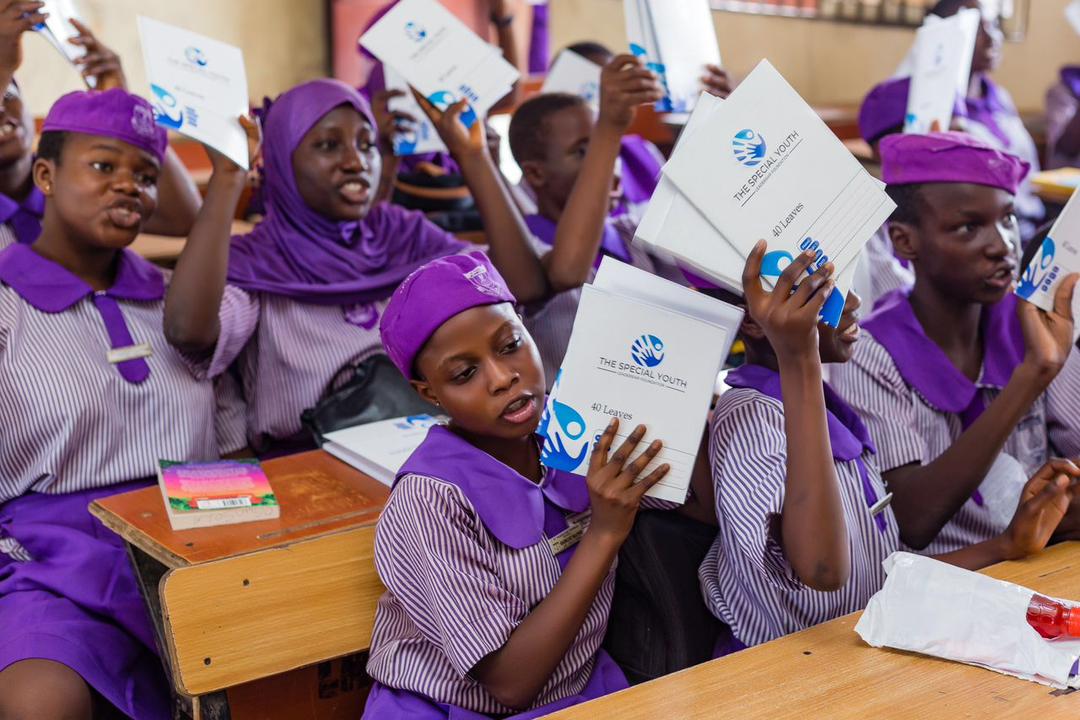By Isaac Atunlute
After a ghastly car accident left his parents hospitalised, Daniel Akinlade’s education fell into a kind of limbo. For eight months, the seven-year-old stayed out of school as his parents struggled through a slow, painful recovery that drained the family’s savings.
Each day seemed to pull him further away from his dream of becoming a pilot—until the summer of 2023, when his school introduced him to a network of education professionals.
He was soon offered a scholarship through a nonprofit organisation known as the Special Foundation that’s committed to broadening access to education in Nigeria.
Daniel’s case is as much a national crisis as a personal tragedy. Insecurity and abject circumstances have pushed millions of kids across Nigeria to drop out of school. Roughly 11,000 schools in the northeast have closed owing to a spate of kidnappings and armed attacks in the region.
Elsewhere, schools grapple with overcrowded classrooms and decrepit buildings, including a severe lack of teachers. Literacy rates are so poor that only one in four children aged 7-14 can read a simple sentence. With rampant inflation eroding their incomes, families face a dilemma between buying food and keeping their wards in school.
A 2022 report by SBM Intelligence, a Lagos-based research outfit, estimates that Nigeria loses about 7.8% of its GDP each year due to an inadequately educated population.
In rural areas, where repressive cultural norms and early marriage keep girls out of school, less than 45% of enrolled girls complete primary school.
It is this sobering reality that makes the work of the Special Foundation urgent.
Founded in 2018, the foundation aims to raise a generation of future African leaders through a model centred on mentorship and education support. “We saw a gap in the education sector,” says Mifa Adejumo, a representative of the organisation.
Having matched Daniel with a sponsor, the foundation also extended a scholarship to his elder brother, Victor, now studying Computer Engineering,
“We believe potential shouldn’t be limited by circumstance,” adds Adejumo, explaining that the foundation targets students who have dropped out of school due to economic hardship or the loss of a guardian.
The foundation also prioritises children gifted with academic potential, a creative streak, a flair for leadership or simply a deep curiosity for learning.
Rhema Luke Iyorah, a 15-year-old school prefect with a penchant for the saxophone, is one such beneficiary. Raised by a single parent, Iyorah was connected with the foundation through a local church. He enjoys full scholarship support today.
Headquartered in Lagos, the Special Foundation thrives off a robust network of 423 volunteers and partners spread across 20 states in the country. These community advocates, as they’re called, help to track vulnerable children and struggling schools.
Among its core programmes is its Inspire Scholarship, which doles out school supplies such as uniforms, meals and learning kits to disadvantaged students.
What makes this scholarship model unique, according to Adejumo, is that “every child is paired with a donor who follows their progress. That connection builds accountability, but—more importantly—it tells the child, ‘Someone out there believes in you.’ ”
Currently supporting 35,000 students, the foundation offers additional initiatives, including family welfare support, classroom renovation and literacy campaigns.
In 2024, it partnered with Miss Diaspora Nigeria USA winner, Edeifo Aikhuele, to facilitate a mentorship programme for its partner schools in Lagos. The initiative exposed students to knowledge from diaspora-based Nigerian professionals and shaped their perspective about success in today’s world.
Strategic alliances with corporate organisations such as First Bank, Microsoft and Google have bolstered the foundation’s work.
These partnerships have led to the renovation of numerous run-down schools as well as the installation of expansive libraries and digital-learning tools.
Education experts have long maintained that NGOs play a prominent role in plugging systemic gaps in Nigeria’s education system.
“They can offer scholarships, upgrade old schools, provide learning materials, and even train teachers. This can reignite hope where the system has failed,” notes Deborah Marcus, a school administrator in Abuja.
But these interventions are not without hurdles. Adejumo cites an absence of sustainable funding as a challenge in reaching children and families in far-flung regions in the country.
“What fuels us,” he notes, “is the transformation we see in real time.”
A new documentary series entitled Tales of Hope captures the transformation. It contrasts the bleak past of its beneficiaries with their improved realities, highlighting their resilience and progress.
Its funding challenge notwithstanding, the foundation remains ambitious. It plans to invest in more schools nationwide before 2030. It’s even developed a new web-based tool to evaluating students’ performance in its partner schools
It’s also scaling its summer educational programme to additional states.
“We may not have a single ‘gimmick,’” Adejumo says, “but what we offer is powerful—consistency, community, and care. With the right partners, we’re confident we’ll get to 100,000 children and beyond.”
Daniel Akinlade's education was disrupted by a serious car accident involving his parents, leading to financial struggles and school dropout. His situation is part of a larger educational crisis in Nigeria, where insecurity, cultural norms, and economic hardships have forced millions of children out of school. The Special Foundation, a nonprofit established in 2018, stepped in to help by offering scholarships to children like Daniel. This foundation focuses on providing educational support to disadvantaged children, partnering with volunteers and corporate organizations to renovate schools and set up learning resources.
The foundation's Inspire Scholarship program pairs students with donors, fostering accountability and showing support to those in need. Challenges remain, such as sustainable funding and reaching remote areas, but the foundation is committed to transforming the lives of 35,000 students through various initiatives and strategic partnerships. By 2030, they plan to expand their reach and develop new tools for evaluating student performance, with the ambition of assisting over 100,000 children. Their work is an example of how NGOs can play a critical role in addressing systemic gaps in Nigeria's education system.






